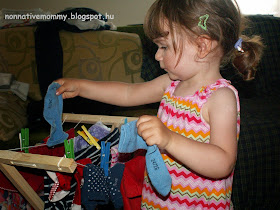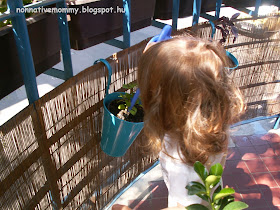This weekend is all about relatives and languages. This is E's first real life test of her English (apart from our native Nanny). My husband's brother (M) and Spanish speaker wife (V) came to visit (they live in Germany) and I also had a little chance to practise my Spanish (which is surprisingly good, taken into account the little I've had to study in the last couple of months). This was my test.
E's test was to meet her 7 year old native English speaker cousin (K) as my husband's uncle and his family also came home for a visit (they live in the UK).
E's test was to meet her 7 year old native English speaker cousin (K) as my husband's uncle and his family also came home for a visit (they live in the UK).
To cut the long story short, it was fantastic.
K and E played as if they'd known each other for a long time and language problems were nonexistent. There were some issues because of the age gap between them but not because they did not understand each other.
First, K came up with an idea to make a princess dress for E. So she took some paper, I found some crayons and markers and the work started. Drawing, colouring, sticking, trying on.
 |
| preparing the dresses |
They interacted with each other in the most natural way: asking for a marker, saying thank yous, offering paper and Cellotape to each other and ask what the other is drawing/doing.
 |
| Let's try it on. I'll help you. |
 |
| A beautiful princess |
The magic wand was a great hit when they showed the outcome to everybody around the house.
 |
| Magic wands |
Then they continued playing: I'll turn you into a ... magic wand game. E understood it very quickly and started to say: Mommy, I'll turn you into a bed.
So I lay down and they both climbed and lay on me. But we were frogs, babies, chickens, bum-bums :-D , horses, cats, princesses and so on.
So I lay down and they both climbed and lay on me. But we were frogs, babies, chickens, bum-bums :-D , horses, cats, princesses and so on.
After this the "Five little monkeys jumping on the bed" game came with a lot of jumping and falling, then they went on to play hide and seek. And this wasn't the end. K improvised a hopscotch, then we watched some Mother Goose Club videos on YouTube. 3 hours flew by really fast, we hardly noticed it. I should have taken more photos but to be honest I just wanted to enjoy the time with them.
We had a lovely time together and loads of fun. E passed her first "test" with flying As. She wanted to play with K no matter what (once K wanted to lift her up and dropped her. E cried for 2 minutes then running after K asked her to play more).
I was so proud of her managing in English and enjoying herself with an English speaking child to a great extent. The best feedback ever!!!

















.JPG)
.JPG)

.JPG)
.JPG)


